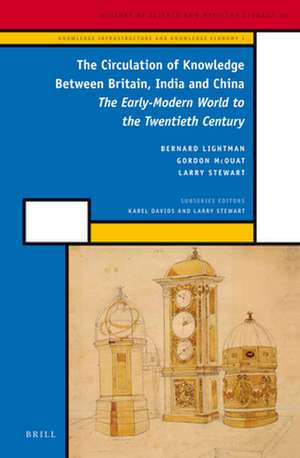The Circulation of Knowledge Between Britain, India and China: The Early-Modern World to the Twentieth Century: Knowledge Infrastructure and Knowledge Economy, cartea 3
Bernard Lightman, Gordon McOuat, Larry Stewarten Limba Engleză Hardback – 20 iun 2013
Contributors include Karen Smith, Larry Stewart, Savrithri Preetha Nair, Jan Golinski, Arun Bala, Jonathan Topham, Khyati Nagar, Yang Haiyan, Fa-ti Fan, Grace Yen Shen, Jahnavi Phalkey, Veena Rao, and Sundar Sarukkai.
Preț: 663.99 lei
Preț vechi: 809.74 lei
-18% Nou
Puncte Express: 996
Preț estimativ în valută:
127.09€ • 130.97$ • 107.29£
127.09€ • 130.97$ • 107.29£
Carte indisponibilă temporar
Doresc să fiu notificat când acest titlu va fi disponibil:
Se trimite...
Preluare comenzi: 021 569.72.76
Specificații
ISBN-13: 9789004244412
ISBN-10: 9004244417
Pagini: 364
Dimensiuni: 155 x 235 x 25 mm
Greutate: 0.7 kg
Editura: Brill
Colecția Brill
Seria Knowledge Infrastructure and Knowledge Economy
ISBN-10: 9004244417
Pagini: 364
Dimensiuni: 155 x 235 x 25 mm
Greutate: 0.7 kg
Editura: Brill
Colecția Brill
Seria Knowledge Infrastructure and Knowledge Economy
Cuprins
Acknowledgements
Preface: The Dalhousie University James Dinwiddie Collection, by Karen Smith
Introduction by the Editors
I. Circulating Knowledge: James Dinwiddie in China, India, and Britain
1. The Spectacle of Experiment: Instruments of Circulation, from Dumfries to Calcutta and Back, by Larry Stewart
2. “Bungallee House set on fire by Galvanism”: Natural and Experimental Philosophy as Public Science in a Colonial Metropolis (1794-1806), by Savithri Preetha Nair
3. From Calcutta to London: James Dinwiddie’s Galvanic Circuits, by Jan Golinski
II Circulation Beyond Dinwiddie
4. Bringing Eastern Science to the West: Portuguese Voyages of Intellectual Discovery, by Arun Bala
5. Anthologizing the Book of Nature: The Circulation of Knowledge and the Origins of the Scientific Journal in Late Georgian Britain, by Jonathan R. Topham
6. Between Calcutta and Kew: The Divergent Circulation and Production of Hotus Bengalensis and Flora Indica, by Khyati Nagar
III. The Circulation of Evolution, Geology, and Antiquities in China
7. Knowledge Across Borders: The Early Communication of Evolution in China, by Yang Haiyan
8. Circulating Material Objects: The International Controversy Over Antiquities and Fossils in Twentieth-Century China, by Fa-ti Fan
9. Going with the Flow: Chinese Geology, International Scientific Meetings and Knowledge Circulation, by Grace Yen Shen
IV. Building Science in Modern India
10. How May We Study Science and the State in Postcolonial India?, by Jahnavi Phalkey
11. A Western Scientist in an Eastern Context: J. B. S. Haldane’s Contributions to the Development of Science in India, by Veena Rao
V. Conclusion
12. Translation as Method: Implications for History of Science, by Sundar Sarukkai
Index
Preface: The Dalhousie University James Dinwiddie Collection, by Karen Smith
Introduction by the Editors
I. Circulating Knowledge: James Dinwiddie in China, India, and Britain
1. The Spectacle of Experiment: Instruments of Circulation, from Dumfries to Calcutta and Back, by Larry Stewart
2. “Bungallee House set on fire by Galvanism”: Natural and Experimental Philosophy as Public Science in a Colonial Metropolis (1794-1806), by Savithri Preetha Nair
3. From Calcutta to London: James Dinwiddie’s Galvanic Circuits, by Jan Golinski
II Circulation Beyond Dinwiddie
4. Bringing Eastern Science to the West: Portuguese Voyages of Intellectual Discovery, by Arun Bala
5. Anthologizing the Book of Nature: The Circulation of Knowledge and the Origins of the Scientific Journal in Late Georgian Britain, by Jonathan R. Topham
6. Between Calcutta and Kew: The Divergent Circulation and Production of Hotus Bengalensis and Flora Indica, by Khyati Nagar
III. The Circulation of Evolution, Geology, and Antiquities in China
7. Knowledge Across Borders: The Early Communication of Evolution in China, by Yang Haiyan
8. Circulating Material Objects: The International Controversy Over Antiquities and Fossils in Twentieth-Century China, by Fa-ti Fan
9. Going with the Flow: Chinese Geology, International Scientific Meetings and Knowledge Circulation, by Grace Yen Shen
IV. Building Science in Modern India
10. How May We Study Science and the State in Postcolonial India?, by Jahnavi Phalkey
11. A Western Scientist in an Eastern Context: J. B. S. Haldane’s Contributions to the Development of Science in India, by Veena Rao
V. Conclusion
12. Translation as Method: Implications for History of Science, by Sundar Sarukkai
Index
Notă biografică
Bernard Lightman, Ph.D. (1979), Brandeis University, is Professor Humanities at York University. Current editor of Isis, his major publications include Origins of Agnosticism (Johns Hopkins, 1987), Victorian Science in Context (Chicago, 1997), and Victorian Popularizers of Science (Chicago, 2007).
Gordon McOuat, PhD 1996, University of Toronto, is Professor of History of Science, University of King's College. Currently the Director of "Situating Science: Canadian National Cluster for the Humanities and Social Studies of Science", he has published The Origins of Natural Kinds (2009), Descartes and the Modern (Cambridge Scholars, 2008), Bentham's Logic (2008), amongst others.
Larry Stewart, Ph.D. (1978), University of Toronto, is Professor of History at the University of Saskatchwan. He has published numerous articles on 18th century science, The Rise of Public Science (Cambridge, 1992) and, with Margaret Jacob, Practical Matter. Newton's Science in the Service of Industry and Empire, 1687-1851 (Harvard, 2004).
Gordon McOuat, PhD 1996, University of Toronto, is Professor of History of Science, University of King's College. Currently the Director of "Situating Science: Canadian National Cluster for the Humanities and Social Studies of Science", he has published The Origins of Natural Kinds (2009), Descartes and the Modern (Cambridge Scholars, 2008), Bentham's Logic (2008), amongst others.
Larry Stewart, Ph.D. (1978), University of Toronto, is Professor of History at the University of Saskatchwan. He has published numerous articles on 18th century science, The Rise of Public Science (Cambridge, 1992) and, with Margaret Jacob, Practical Matter. Newton's Science in the Service of Industry and Empire, 1687-1851 (Harvard, 2004).






